Visitors to the 2011 Detroit Conference “Rebound In Motown” will see Barry Gordy’s two-story frame house where the musical magic happened on Detroit’s West Grand Boulevard. Our private tour includes a glimpse of the famous Motown echo chamber and a studio visit where you can stand in the footsteps of Diana Ross and Stevie Wonder. Here are some of the recording artists made famous in Hitsville USA.
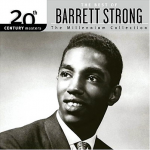 Money (That’s What I Want) by Barrett Strong
Money (That’s What I Want) by Barrett Strong
“Money” was Motown Records’ first official hit. Recorded by Barrett Strong in 1959, it got to No. 2 on the R&B charts and 23rd on the U.S. pop charts. “Money” gave Motown a much-needed hit when funds were getting low.
Barrett Strong later went on to become one of Motown’s most famous song writers. Some of the hits he wrote or co-wrote include “I Heard It Through the Grapevine,” “War,” “Smiling Faces Sometimes,” “I Can’t Get Next to You,” “Ball of Confusion (That’s What the World Is Today)” and “Papa Was a Rollin’ Stone.”
For writers, “Money” is a lesson in the strength of repetition and economy. The song contains a total of just 162 words. The phrase, “That’s what I want” is repeated 19 times, making up half the song.
Please, Mr. Postman by The Marvelettes
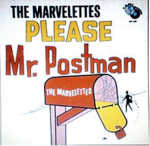 “Please Mr. Postman” was the debut single by The Marvelettes for the Tamla label (one of many run by Motown). “Mr. Postman” was the first Motown song to reach the No. 1 position on the Billboard Hot 100 pop singles chart. The single achieved this position in late 1961; it hit number one on the R&B chart as well.
“Please Mr. Postman” was the debut single by The Marvelettes for the Tamla label (one of many run by Motown). “Mr. Postman” was the first Motown song to reach the No. 1 position on the Billboard Hot 100 pop singles chart. The single achieved this position in late 1961; it hit number one on the R&B chart as well.
The Marvelettes were originally formed by Gladys Horton and Georgia Dobbins as the Casinyets (or “Can’t Sing Yets”) in their hometown Inkster, a Detroit suburb, with backing vocalists Georgeanna Tillman, Wyanetta (usually spelled “Juanita”) Cowart, and Katherine Anderson. After finishing fourth in the Inkster High School talent contest, the got an audtion at Motown records. Georgia brought in a friend who wrote songs, including what became “Mr. Postman.” Gladys, who died in January at the age of 66, sang the lead vocal. After the song hit, Wanda Young replaced Georgia Dobbins, whose church-going father was against the idea of his daughter singing in nightclubs.
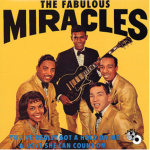 Shop Around by Smokey Robinson and The Miracles
Shop Around by Smokey Robinson and The Miracles
The Miracles were known as Motown’s “soul supergroup,” and the single “Shop Around” was Motown’s first million-selling hit record. The Miracles went on to become one of Motown’s signature acts of the 1960s. During the same period, the Miracles’ original lead singer and founding member Smokey Robinson became one of the most successful songwriters and record producers of all time. During their nineteen-year run on the American music charts, The Miracles charted more than 50 hits.
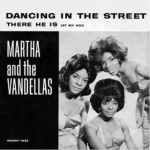 “Dancing in the Street” by Martha & The Vandellas
“Dancing in the Street” by Martha & The Vandellas
“Dancing in the Street” was recorded in 1964 by Martha and the Vandellas and is one of the Motown label’s signature songs. Just recently, Martha Reeves served as a Detroit City Councilwoman, lending a note of elegance and soul few city governments ever will match.
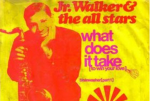 “What Does It Take” by Jr. Walker and The All Stars
“What Does It Take” by Jr. Walker and The All Stars
Jr. Walker hit the Top 5 in 1969 with, “What Does It Take (To Win Your Love).” One of the famous Motown quality control meetings rejected the song for single release but radio station DJs made the track popular, forcing Motown to release it as a single. It ultimately hit No. 4 on the Hot 100 and No. 1 on the R&B chart. From that time on Walker sang more on the records than earlier in their career. He landed several more R&B Top Ten hits over the next few years.
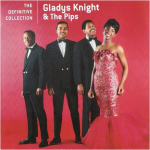 I Heard It Through The Grapevine by Gladys Knight & The Pips
I Heard It Through The Grapevine by Gladys Knight & The Pips
Gladys Knight & The Pips recorded the third or fourth version of “Grapevine” for Motown, but theirs was the first version to hit, reaching No. 1 on the Billboard R&B chart on Nov. 25, 1967, and staying there for six weeks. It was the group’s second R&B No. 1. The song also hit No. 2 on the Billboard Pop Singles chart, nearly overtaking The Monkees’ “Daydream Believer.” The Pips version of “Grapvevine” was Motown’s best-selling single to that point.
Sure, everyone knows Marvin Gaye had a bigger hit with his own version, which was recorded earlier, and features a slower, more crooning vocal. But for pure soul and danceability, you can’t beat Gladys and The Pips.
![temptations[1]](https://www.columnists.com/wp-content/uploads/2011/04/temptations1-147x150.png) “Ain’t Too Proud To Beg” by The Temptations
“Ain’t Too Proud To Beg” by The Temptations
“Ain’t Too Proud To Beg,” released in 1966, peaked at number 13 on the Billboard Pop Chart, and was a No. 2 hit on the Billboard R&B charts for eight non-consecutive weeks. The song has been covered by everyone from Count Basie to the Rolling Stones and is a bona fide Motown classic.
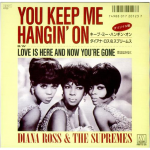 You Keep Me Hangin’ On by The Supremes.
You Keep Me Hangin’ On by The Supremes.
“You Keep Me Hangin’ On” was a No. 1 hit in 1966. Becoming The Supremes’ eighth number-one single, “You Keep Me Hangin’ On” topped the Billboard Hot 100 pop singles chart for two weeks in November 1966 and the magazine’s soul chart for four weeks. The track is one of the most covered Supremes songs.
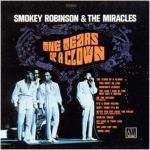 “The Tears of a Clown” by Smokey Robinson & The Miracles
“The Tears of a Clown” by Smokey Robinson & The Miracles
“The Tears of a Clown” was originally released on the Tamla (Motown) label on the 1967 album “Make It Happen.” It was re-released in the United Kingdom as a single in September 1970, where it became a No. 1 hit on the UK singles chart. Subsequently, Motown released “The Tears of a Clown” as a single in the United States as well, where it quickly went to the top of the Billboard Hot 100 and R&B Singles Chart. Its success caused Miracles lead singer, songwriter, and producer Smokey Robinson, who had announced plans to leave the act, to stay until 1972.
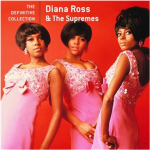 “Stop! In the Name of Love” by The Supremes.
“Stop! In the Name of Love” by The Supremes.
“Stop! In the Name of Love” was a 1965 No. 1 hit single for The Supremes. The group’s choreography for this song, with one hand on the hip and the other outstretched in a “stop” gesture, is equally legendary. Paul Williams and Melvin Franklin of The Temptations taught the girls the routine backstage in London, before the Supremes’ first televised performance of the single on the Ready Steady Go! special “The Sound of Motown.”

